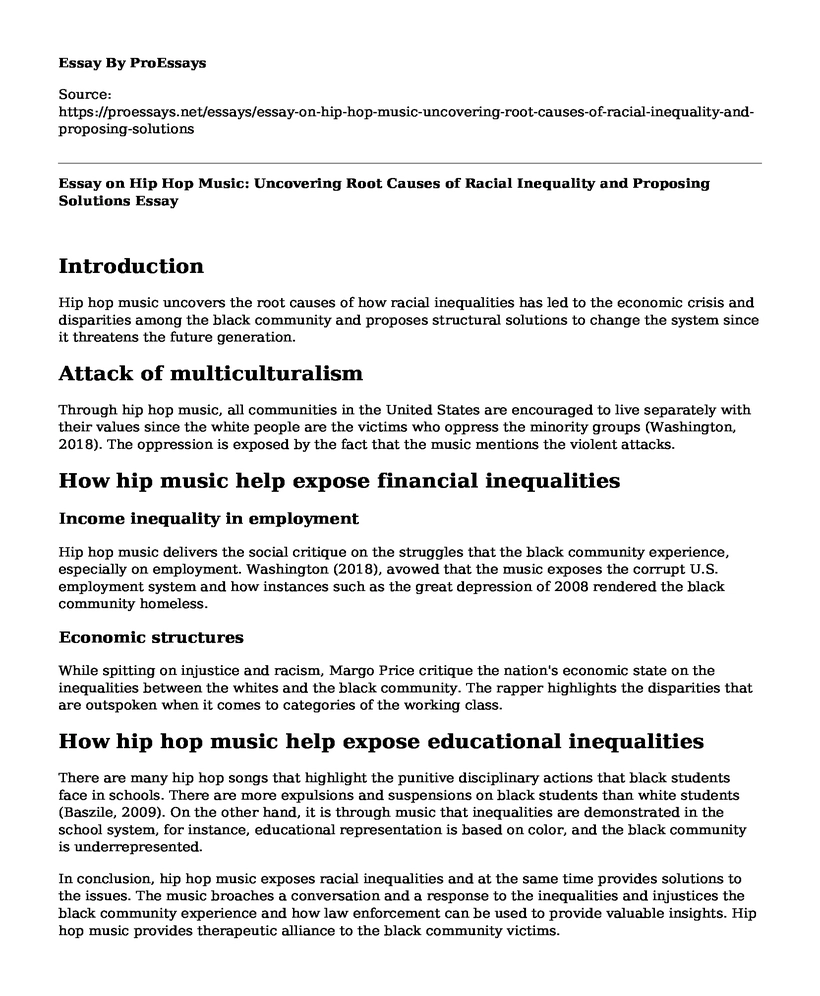Introduction
Hip hop music uncovers the root causes of how racial inequalities has led to the economic crisis and disparities among the black community and proposes structural solutions to change the system since it threatens the future generation.
Attack of multiculturalism
Through hip hop music, all communities in the United States are encouraged to live separately with their values since the white people are the victims who oppress the minority groups (Washington, 2018). The oppression is exposed by the fact that the music mentions the violent attacks.
How hip music help expose financial inequalities
Income inequality in employment
Hip hop music delivers the social critique on the struggles that the black community experience, especially on employment. Washington (2018), avowed that the music exposes the corrupt U.S. employment system and how instances such as the great depression of 2008 rendered the black community homeless.
Economic structures
While spitting on injustice and racism, Margo Price critique the nation's economic state on the inequalities between the whites and the black community. The rapper highlights the disparities that are outspoken when it comes to categories of the working class.
How hip hop music help expose educational inequalities
There are many hip hop songs that highlight the punitive disciplinary actions that black students face in schools. There are more expulsions and suspensions on black students than white students (Baszile, 2009). On the other hand, it is through music that inequalities are demonstrated in the school system, for instance, educational representation is based on color, and the black community is underrepresented.
In conclusion, hip hop music exposes racial inequalities and at the same time provides solutions to the issues. The music broaches a conversation and a response to the inequalities and injustices the black community experience and how law enforcement can be used to provide valuable insights. Hip hop music provides therapeutic alliance to the black community victims.
How Hip Hop has exposed Racial, Financial, and Educational Inequalities
In recent years, there has been a lot of controversy surrounding hip hop music in the American media (Blanchard 1999). It started with the racial rivalry of "East Coast-West Coast" that resulted into the murders of rappers Tupac Shakur and Notorious B.I.G. to restricting equal educational opportunities to black students like the whites, and even demonizing them after mass school gunfire in Littleton, Colorado. Contemporary, hip hop culture edifies the beginning of rap songs amongst the black communities through unraveling racial inequalities subjected to them by whites. It functions as a voice to represent the marginalized black community.
Hip Hop music has been at the forefront advocating for equal funding for public education, proposals for universal health care and Affirmative Action in the 1990s on behalf of the black community (Blanchard 1999). They have also helped in bridging the gap between economic and political power with a view of trying to end discrimination and violence in American society.
Hip Hop culture has also been at the forefront in expressing frustrations against various forms of discriminations such as education, and financial which was rampant in the USA. For instance, in the late 1980s, hip hop was really against police brutality, stop and frisk practices subjected to African-Americans (Blanchard 1999). Through renowned rappers like "Wyclef, LL Cool J, and Will Smith," many African American youths gain hope as they see the music industry as one of their chances to gain fame and wealth and escape from discrimination and all forms of inequalities. These rap musicians are advocating for the incorporation of hip-hop in music education programs in a bid to increase the enrolment of black students, and allowing teachers to wholesomely relate students interest with the curriculum. They are mostly focusing on rap to be integrated into English and Language arts through poetry and drama to enhance social interaction which will encourage equality and dispel racial discrimination.
References
Blanchard, B. (1999). The social significance of rap & hip-hop culture. Retrieved from Ethics of Development in a Global Environment (EDGE) website: http://web. Stanford. edu/class/e297c/poverty_prej udice/mediarace/social significance. htm.
Baszile, D. T. (2009). Deal with it we must: Education, social justice, and the curriculum of hip hop culture. Equity & Excellence in Education, 42(1), 6-19.
Washington, A. R. (2018). Integrating HipHop Culture and Rap Music Into Social Justice Counseling With Black Males. Journal of Counseling & Development, 96(1), 97-105.
Cite this page
Essay on Hip Hop Music: Uncovering Root Causes of Racial Inequality and Proposing Solutions. (2023, Jan 26). Retrieved from https://proessays.net/essays/essay-on-hip-hop-music-uncovering-root-causes-of-racial-inequality-and-proposing-solutions
If you are the original author of this essay and no longer wish to have it published on the ProEssays website, please click below to request its removal:
- The Sociology of Crime and Deviance - Research Paper
- Quebec Population Immigration and Employment Essay
- Photography: Final Module Self Evaluation
- What is Trust? - Essay Sample
- Essay on Counselors Helping Battered Women to Overcome Career Challenges
- Essay Example on Disabilities & Our Communities: Inevitable Issues & Anticipated Futures
- Free Essay Sample on Images of Pain







